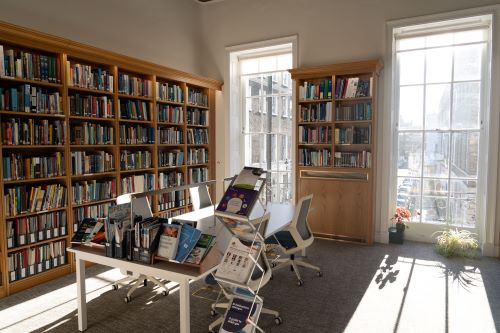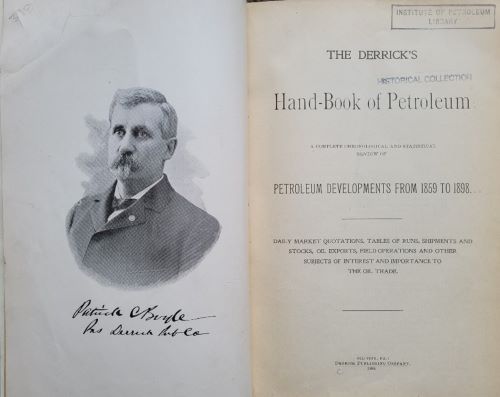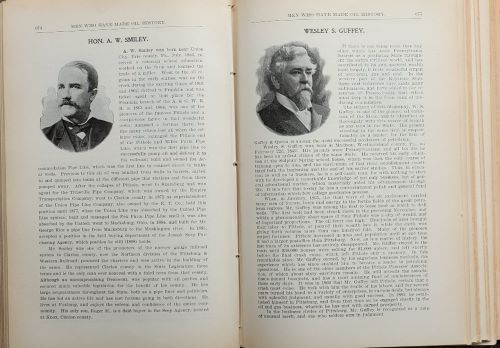Library of the Week: 9th May: This week we have a brilliant post from the Energy Institute Library! Claire Cortis (Digital Knowledge and Information Manager) and Catherine Cosgrove (Librarian) share more about the library and the collections and services available. Thank you to the Energy Institute Library for taking part!
In 1913 the Institute of Petroleum was established by Sir Boverton Redwood and Mr Arthur Eastlake in a “spare corner” of Eastlake’s London offices. Redwood emphasised the need for an organisation to amalgamate the diverse knowledge and interests of those engaged in the developing oil industry, especially as the British naval fleet was converting from coal to oil powered ships and war was forecast.
In 1927 The Institute of Fuel was formed from the merger of the Institution of Fuel Economy Engineers (IFEE) (formed 1925) and the Institution of Fuel Technology (IFT) (formed 1926). It was renamed the Institute of Energy in 1979 to reflect the fact that all forms of energy needed to be addressed. The Institute of Petroleum moved to 61, New Cavendish Street, London in 1957 and merged with the Institute of Energy in 2003 to form the Energy Institute as we know it today.
The Energy Institute is the chartered professional membership body for people who work across the world of energy. Our purpose is creating a better energy future for our members by accelerating a just global energy transition to net zero.
The Energy Institute Library holds an extensive collection of material on the energy industries ranging from oil exploration to petrol retailing, nuclear energy to renewables, technical to business and dating from the mid-19th century to the present day. It is a peaceful and architecturally beautiful space for people to visit and work in.

Catherine Cosgrove who has been a Librarian at the Energy Institute for over 30 years describes one of her favourite items in the library collection, The Derrick’s Hand-Book of Petroleum.

The Derrick’s Hand-Book of Petroleum provides a complete chronological and statistical review of petroleum developments from 1859 to 1898.
It includes “daily market quotations, tables of runs, shipments and stocks, oil exports, field operations and other subjects of interest and importance to the oil trade” (Derrick Publishing Company, 1st ed, 1898) [Over 1000 pages]
This is a fascinating book for anyone researching the early days of the petroleum industry, especially in the USA.
The Chronology gives a brief account year by year, and then nearly every day of what was happening in the oil industry – drilling activity; wells sunk and what they produced; names of people killed in explosions, protests against unfair charges on the oil companies; bills introduced in Congress to regulate the industry and companies servicing it; refinery activity; trading; advertisements, etc.
The most interesting section is “Men who have made oil history”, both living at time of publication and deceased, with a page or two of bibliography and a portrait.

The Energy Institute Library is run by the Energy Institute Knowledge Team or EIKS. EIKS is the centre for energy knowledge at the Energy Institute. We provide accurate and balanced energy information to support people’s work or studies. We also carry out our own research and engage Energy Institute members to create new sources of information and inform energy policy. Not only do we manage the physical library, we create and provide access to a vast amount of digital content. This can be found via the Energy Institute website “Exploring Energy” section and our Knowledge website.
The Team produces a multitude of content including Energy Insights, Energy Essentials Guides, an annual Energy Barometer, capturing insights from our members and most recently a podcast called Energy in Conversation which is described as a plain-speaking, thought-provoking look into our energy future, through the eyes of the people leading the way. Season 2 explores the views and hopes of young energy professionals from around the world, as part of the EI’s Generation 2050 initiative. From the future of the electricity grid, to low-carbon finance, to the development of new energy technologies like carbon capture and storage, our guests chat about the biggest changes and challenges facing the sector.
Our eLibrary, available to our members worldwide, 24/7, contains up-to-date energy information. There are 240 full text eBooks as well as 3.8 million records on all types of energy via Ebsco Energy and Environment Complete, 400 full text journals via Ebsco Energy and Power Source and full text articles on Sustainability via the Sustainability Reference Centre.
Unfortunately, the Energy Institute Library was closed for most of the pandemic, opening only for brief spells. The Energy Institute Library is now open to all visitors on Tuesdays by appointment only. Please see our Library page for information on how to book. All visitors are welcome to the library for free. Non-members can use the space as a reference library, while Energy Institute members are able to borrow items. Library facilities include borrowing items and inter-library loans; research and workspace; Wi-Fi access; access to our collection of periodicals and photocopying, printing and scanning. We look forward to welcoming you!
Another great reason to visit the library is to see our amazing painted ceiling dating from 1777, complete with chariot and mythical beasts…

Claire Cortis, Digital Knowledge and Information Manager and Catherine Cosgrove, Librarian, Energy Institute Knowledge Service
All images copyright of the Energy Institute, reproduced with kind permission of the copyright holder.
You can explore the library’s collections on Discover and find further contact details on their Discover information page.

